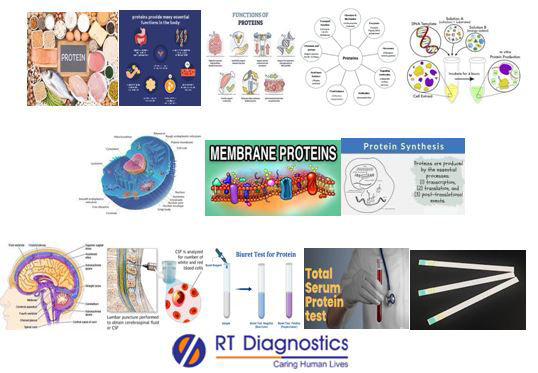Protein - CSF:
Why Protein -CSF Test?
CLINICAL INFORMATION
CSF is cerebrospinal fluid a colourless body fluid that flows in the space around the spinal cord and brain. Test for CSF analysis is performed to help diagnose diseases or abnormal conditions that affect the brain (CNS) and spinal cord. The function of CSF is to cushion the brain within the skull from physical trauma (protects the brain and spine from injuries) and it also delivers the nutrients to the CNS. CSF testing is performed to evaluate the level and concentration of different substances (constituents in normal physiological composition) and its pressure also helps to study certain related pathologies. Moreover, cells in CSF in studied to diagnose the pathological conditions affecting the brain and the spinal cord. Hence during any CNS manifestations, aspiration of CSF sample specimen is performed. Hence LDH CSF fluid test is performed to screen to detect the underlying pathology in the brain and spinal cord. The liver makes proteins from the food we consume and produce new proteins as needed by our body. A total protein test measures the amount of protein in your blood i.e. albumin and globulin levels in the body. Proteins are important for the health and growth of the body’s cells and tissues. Hence this test result can help diagnose a number of health conditions such as nutrient deficiencies, unexpected weight loss, fatigue and abnormalities of liver and kidney-related diseases. Albumin is a blood protein present in the body. It is used for cell growth and for tissue repair. Usually, albumin is not excreted in the urine, while in certain abnormal conditions the low molecular weight albumin tends to get excreted in pathologies related to kidneys known as albuminuria. Healthy kidneys do not excrete any proteins, because the molecular weight of proteins is much higher than the pore size of the glomerular filters in the kidneys (nephrons). This test is usually done for altered levels of albumin in blood i.e. either in ‘hyperalbuminemia’ and/or ‘hypoalbuminemia’. Hyperalbuminemia is seen in patients on high-fat diets for exercise and hepatocellular carcinoma. Hypoalbuminemia is seen in conditions due to impaired synthesis, increases utilization by the system, distributional causes or increased excretion. The causes could be infection and inflammation, liver diseases, kidney diseases, malnutrition or malabsorption. It can lead to complications like hypovolemia and circulatory collapse due to decreased oncotic pressure and/or fluid overload. This test is usually done for abnormal levels of proteins in blood i.e. either too high or too low. Hyperproteinemia is seen in patients on a high-fat diet for exercise, dehydration, infection, hepatocellular carcinoma or multiple myeloma. Symptoms include intestinal discomfort and indigestion, dehydration, exhaustion, nausea, irritability, headache, diarrhoea etc. This test is suggested for patients with symptoms of protein in urine causing frothy urine, fluid retention causing swelling, weakness, rapid heartbeat, vomiting, diarrhoea and nausea etc. Other clinical manifestations include skin, hair and nail problems, loss of muscle mass, increased risk of bone fractures, increased appetite and increased calorie intake, risk of infection, fatty liver, restricted growth in children etc. This test checks the levels of albumin in a person’s blood. If the result indicates an abnormal amount of albumin, it may suggest nutrient deficiency or problems in the liver or kidneys. Moreover, high levels of proteins in CSF indicate a tumour, multiple sclerosis, meningitis, inflamed spinal cord, bleeding in the brain, Lyme disease, aseptic meningitis, bacterial meningitis, brain abscess, epilepsy, neurosyphilis, Tubercular meningitis (AFB), hyper-osmolar coma, an autoimmune disease affecting the brain and spinal cord, inflammation (vasculitis) or injury. Additional tests on pleural fluid other than culture and sensitivity include measurement of pleural fluid, estimation of biochemical parameters such as glucose, lactate, amylase, triglyceride, enzyme assay, tumour markers such as CEA, Chest X-Rays, CT Scan, Gram stain, fungal test, stool test for cysts in parasitic infestation, molecular assays, PCR, AFB test and adenosine deaminase to detect tuberculosis etc. Other tests include CBC, albumin, glucose, chromatographic methods, colorimetric methods, spectrometry, kit methods, liquid chromatography – Tandem Mass Spectroscopy (LC-MS/MS) etc.

General Instructions:
Sample Requirement:Specimen - CSF. Test Preparation: None.
NOTE - Sample for specimen collections may vary based on the patient’s condition/cases according to the patient’s presenting complaints/signs or symptoms:
SPECIMEN REQUIREMENT (Special or Rare Cases) - As instructed and guided by Physician / Clinician / Pathologist / as per Laboratory’s requirements, according to procedures and protocols.
This Multi-Specialty Clinical Referral Laboratory RT DIAGNOSTICS provides precise and accurate tests with an extensive range of testing services to the medical centres to help in the diagnosis and identification of pathology in the test specimens for infectious diseases and also to evaluate the function of organ systems of the patient. It prevents further complications and helps to stabilize and restore health to near normalcy at the earliest without delay.



